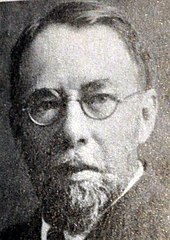Viktor Roth (historian)
Viktor Roth (born April 28, 1874 in Szászsebes , German Mühlbach , Kingdom of Hungary , Austria-Hungary ; † April 17, 1936 in Sebeş , Kingdom of Romania ) was a Protestant theologian and historian from Transylvania .
Life
Roth, the son of a teacher, studied Protestant theology according to the Augsburg Confession (AB) as well as German and Latin in Klausenburg , Halle (Saale) , Erlangen and Tübingen from 1892 to 1897 . From 1897 he worked at the Evangelische Volksschule AB in Nagysink ( Groß-Schenk ), from 1898 as rector. From 1898 to 1902 he taught at the lower secondary school in Szászsebes ( Mühlbach ). In Szászszentlászló ( Großlasseln ) he worked as a pastor from 1902 to 1911 and then as a city preacher in Sibiu until 1918, then as a city pastor again in Mühlbach from 1918 (from 1920 the place had the Romanian name Sebeş ).
plant
Roth compiled a comprehensive inventory of German art monuments in Transylvania:
- History of German architecture in Transylvania . In: Studies on German Art History 64, 1905
- History of German sculpture in Transylvania . In: Studies on Germans. Art history 75, 1906
- Transylvanian-Saxon art in Magyar research . In: Archives of the Association for Transylvanian Cultural Studies. NF 39, 1913
- Contributions to the art history of Transylvania . In: Studies on German Art History 170, 1914
- Transylvanian altars . In: Studies on German Art History 192, 1916
- The Evangelical Church AB in Mühlbach . 1922
Awards
In 1921 he received an honorary doctorate from the University of Vienna . In 1926 he became an honorary member of the Romanian Academy .
literature
- Viktor Roth. In: Austrian Biographical Lexicon 1815–1950 (ÖBL). Volume 9, Verlag der Österreichischen Akademie der Wissenschaften, Vienna 1988,ISBN 3-7001-1483-4, p. 282.
- Otto Folberth : D. Dr. Viktor Roth was born 100 years ago. In: Correspondence sheet of the working group for Transylvanian cultural studies. 69, 1975, F. 3, p. 24ff.
Web links
- Viktor Roth, PhD 28.4.1874 - 17.4.1936 . In: University of Vienna
- Horst Theil: Dr. Viktor Roth . In: Mühlbach in Transylvania
Individual evidence
- ^ University of Vienna: Viktor Roth, Dr.phil. . Retrieved November 6, 2018.
| personal data | |
|---|---|
| SURNAME | Roth, Viktor |
| ALTERNATIVE NAMES | Roth, Victor |
| BRIEF DESCRIPTION | Hungarian-Romanian Protestant theologian and historian |
| DATE OF BIRTH | April 28, 1874 |
| PLACE OF BIRTH | Szászsebes , Kingdom of Hungary , Austria-Hungary |
| DATE OF DEATH | April 17, 1936 |
| Place of death | Sebeș , Kingdom of Romania |
